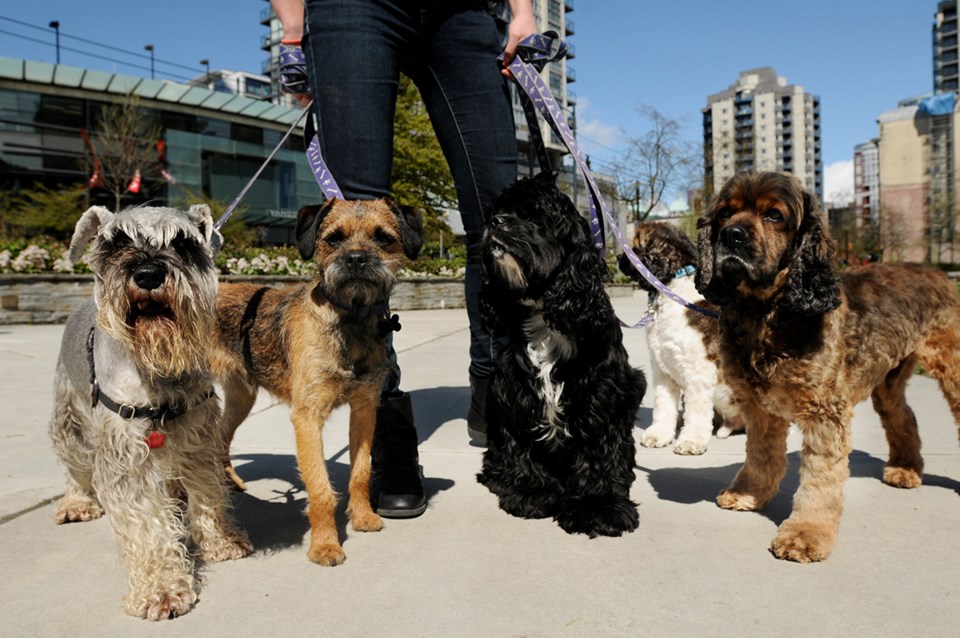Is living in Vancouver making you feel disconnected, lonely, or possibly unhealthy? We are led to believe it is a big problem here.
Organizations such as the Vancouver Foundation have released survey results that suggest we have a neighbourliness deficit. Even the Mayor felt compelled to strike a task force to brainstorm a way out of our not-so-splendid isolation.
Our city’s dog owners, on the other hand, probably wonder what all the fuss was about. That is because few things bring people out of their homes and interacting with their neighbours like dog walking.
A new study from the Human Animal Bond Research Initiative (HABRI) Foundation concludes that there are profound benefits to our society through our relationships with pets.
Should our city’s planners and engineers therefore consider pet ownership as we shape our surroundings?
The diverse health outcomes from pet ownership are familiar to many, such as reductions in stress and anxiety, and lower blood pressure. There is some evidence that animal therapy has positive effects on Alzheimer’s patients, and rehabilitation for children.
The HABRI report — which was sponsored by pet industry suppliers — is the first to put a dollar figure on these benefits. It looked at the reductions in visits to physicians’ offices and the way dog walking reduces obesity rates, and calculated that billions are saved across the continent in annual health care costs.
We fret over the supposed lack of human interaction that results from urban living. Last summer, an earnest “Say Hi to a Stranger” campaign was even begun to address this.
The interactions between people might have been more frequent and less awkward, however, if there was an animal involved.
Pets, like many other common interests, have an amazing capacity to bring their owners together with strangers. Whether it is in the leafy suburbs or our dense urban centres, we interact more successfully when we have our animals at our side.
It is said that in Vancouver just over one-third of households have a dog. Look around and you will spot them everywhere. The dog population is estimated to be up to 150,000 in the City of Vancouver alone.
Recent studies say millennials are driving up the rates of dog ownership. Not surprisingly, it is younger dog owners who are the first to build social bonds among residents in a condo building.
Speaking from experience, it is easy to see how dog walkers ambling around our neighbourhoods make communities safer.
Dogs pull people together in an effort to meet the other canines, not the other way around. While the dogs have their sniff, people will often exchange information about home break-ins or when they see a shady character casing someone’s garage.
Dog owners are not the only people creating connections in our city. The new Catfe in International Village, where cat lovers can assemble with friendly felines over a cup of coffee, has been a sensational success.
Two amazing things happened thanks to the Catfe.
It had to close temporarily because all the cats were adopted. It also had people flocking to International Village.
If that does not make local urban planners sit up and take notice, then nothing will.
Having pets in the city is not without its challenges. There are dog owners who are not responsible when it comes to cleaning up after them, or ensuring noise is kept to a minimum.
Some households should simply not have pets.
Public space is also a challenge. There have been many bitter disputes over the use of parks and our waterfront between those who own dogs and those who do not.
Over the years successive Park Boards have struggled to strike a balance. This year, they promise the “most ambitious review of dogs in parks in Park Board history.”
We can be certain that whatever the outcome, it will garner a lot of the public’s attention.
Oddly, nowhere in the 52-page report from aforementioned Mayor’s task force are pets mentioned as a catalyst for strengthening our communities.
Yet, the evidence is overwhelming that our animals make us healthier, safer, more connected and happier as a society.
So should cities be planned for people and their pets too? Absolutely.
@MikeKlassen



